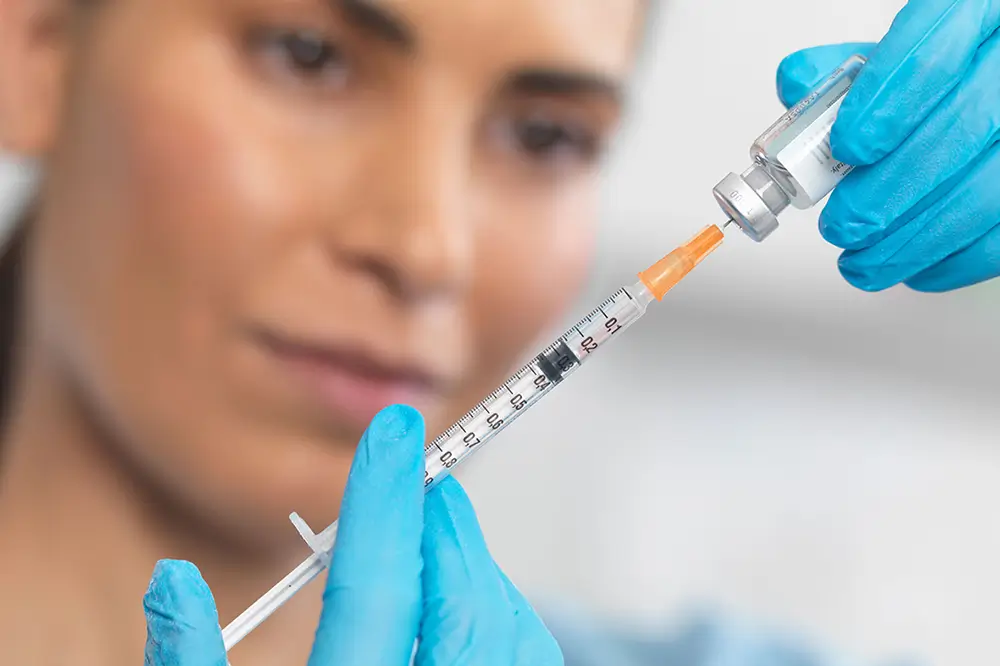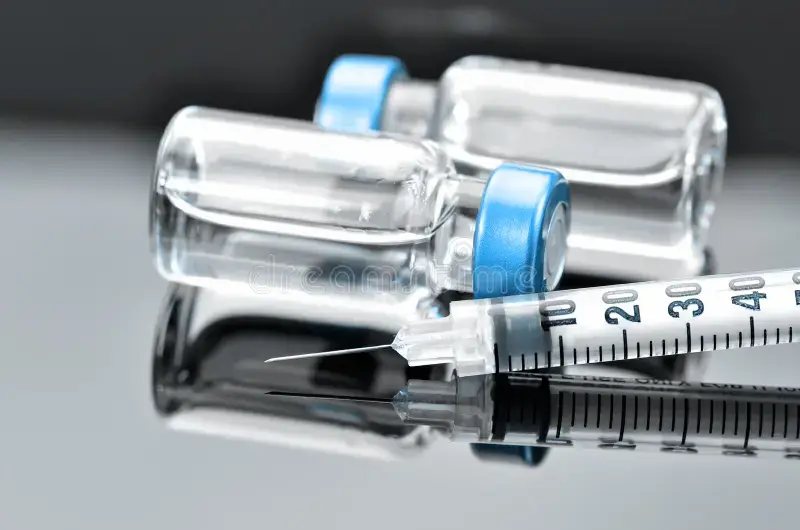Only for Licensed Professionals
Only for Licensed Professionals
.webp)
Remicade Dosing Schedule
David Fuller
Last Updated On: July 8, 2025
A large-scale case-control study has shown that women with endometriosis—a chronic inflammatory condition that affects up to 10% of women—are nearly twice as likely to develop autoimmune diseases such as rheumatoid arthritis, lupus, and multiple sclerosis.
For managing these and other inflammatory conditions, Remicade (infliximab) is often prescribed. As a monoclonal antibody targeting tumor necrosis factor-alpha (TNF-α), Remicade is effective in reducing inflammation and alleviating symptoms associated with diseases like rheumatoid arthritis, Crohn’s disease, ulcerative colitis, and psoriasis.
This article explores the Remicade dosing schedule, outlining the crucial induction and maintenance phases, the recommended administration intervals, and how providers adjust dosages to tailor treatment to individual patient needs.
Key Takeaways
- Clinicians individualize Remicade dosing based on the specific condition, using different doses and infusion schedules for rheumatoid arthritis, Crohn’s disease, and ankylosing spondylitis.
- The induction phase typically involves infusions at weeks 0, 2, and 6. The maintenance phase follows, with infusions usually every 8 weeks. Practitioners may make adjustments for specific conditions.
- Loss of response can occur over time, requiring dose adjustments such as increasing the dose or shortening the infusion intervals, and therapeutic drug monitoring (TDM) is useful for personalizing treatment.
- Clinicians do not routinely recommend premedication for infusion reactions. However, some institutions still use antihistamines or acetaminophen to manage symptoms such as fever and headaches.
- Remicade therapy requires careful administration by trained professionals in a clinical setting, with vital sign monitoring during and after infusion to detect any adverse reactions.
About: Operating since 2016, Med Supply Solutions is known for being one of the industry’s top and trusted suppliers of cosmetic and viscosupplementation products. If you’re interested in purchasing Remicade online, please contact our sales department for more information.

How Remicade Dosing Varies by Indication

Remicade dosing is tailored to meet the specific needs of each patient, and the recommended dose and frequency depend on the condition being treated. These adjustments are based on the severity of inflammation and the body’s response to therapy.
For rheumatoid arthritis, clinicians typically administer Remicade at a dose of 3 mg/kg every 8 weeks, in combination with methotrexate. For ulcerative colitis and Crohn’s disease, the starting dose is 5 mg/kg, with the potential for an increase depending on disease activity and the therapeutic response.
Patients with ankylosing spondylitis or psoriatic arthritis usually begin treatment with 5 mg/kg, and may follow the same induction-to-maintenance transition as those with Crohn’s or ulcerative colitis. Providers consider dose escalation if symptoms persist despite initial therapy.
Induction and Maintenance Phases of Remicade Treatment
The induction phase of Remicade treatment aims to rapidly suppress inflammation and achieve early disease control, with infusions typically given at weeks 0, 2, and 6.
After completing the induction phase, patients enter the maintenance phase, where they typically receive infusions every 8 weeks to maintain disease control and prevent flare-ups. In some cases, providers shorten the interval to every 6 weeks if symptoms return early or inflammation persists.
This ongoing maintenance ensures patients remain in remission. The transition between phases may vary slightly depending on individual patient factors and disease types.
Dose Adjustment for Loss of Response or High Clearance

While Remicade is highly effective for many, over time, some patients may experience loss of response, where the drug’s impact begins to diminish. This can happen as the body clears the drug more quickly or produces antibodies that neutralize its effects.
Some institutions use Therapeutic Drug Monitoring (TDM) to measure infliximab levels and detect antibody formation. However, TDM implementation varies by institution and is not a universal standard.
If a patient experiences loss of response, adjustments to the dosing schedule may include:
- Increasing the dose from 5 mg/kg to 10 mg/kg to compensate for quicker drug clearance.
- Shortening the infusion interval from every 8 weeks to every 4-6 weeks to maintain consistent drug levels.
- Switching to a different biologic agent if antibodies are too high or side effects increase.
- Adding an immunomodulator like methotrexate can help reduce antibody formation and enhance the drug’s effectiveness.
Administration Best Practices for Remicade Infusions
Trained professionals must administer Remicade infusions in a clinical setting. Each infusion typically lasts 2 hours, followed by a brief observation period to monitor for infusion-related reactions.
There has been debate around premedication practices. Current evidence does not support routine premedication for preventing infusion reactions, and many institutions have moved away from this practice based on recent research. Clinicians may still use premedication, such as antihistamines or acetaminophen, in certain cases to prevent common reactions like fever, rash, or mild headaches.
During the infusion, staff should monitor vital signs, including blood pressure, heart rate, temperature, and oxygen levels, to ensure patient safety. A slower infusion rate is recommended, especially for new patients or those with a history of infusion-related side effects.
It’s also essential to ensure the patient is well-hydrated before the infusion. Proper hydration can make venous access easier and also support kidney function, which is vital for processing Remicade.
What to Communicate to Patients About Their Remicade Timeline
Clear communication with patients is crucial for effective Remicade therapy. Patients should also know the importance of adhering to their dosing schedule. Missing doses can result in flare-ups or reduced effectiveness of the drug.
Patients must also be educated on what to avoid while on Remicade, including live vaccines, certain medications, and high-risk environments that could increase infection risk. Offering tools like printed schedules, symptom tracking tools, and reminders can help patients stay on track with their treatment.
Providers should emphasize the importance of early symptom reporting, as this can enable timely dose adjustments and better therapeutic outcomes.
Conclusion
A well-structured Remicade dosing schedule is key to achieving and maintaining remission in autoimmune diseases. By understanding the differing dosing needs based on condition and adjusting therapy when necessary, patients and providers can maximize the therapeutic benefits of Remicade.
Safe and effective administration is critical, and by maintaining proactive communication and lifestyle guidance, long-term success with Remicade therapy can be achieved. Patients who stay engaged and informed are more likely to experience improved outcomes and better quality of life.
FAQs
1. How long does a Remicade infusion take?
Each infusion typically takes around two hours. Afterward, the overseeing clinician observes patients for 30 to 60 minutes to ensure no adverse reactions occur.
2. Can a doctor change Remicade dosing if it becomes ineffective?
Yes. If the standard dose becomes less effective, your doctor may increase the dosage or shorten the interval between infusions, depending on the therapeutic response and lab results.
3. What happens if I miss a Remicade dose?
Missing a scheduled infusion may reduce the drug’s effectiveness and increase your risk of disease flare-ups. Contact your provider immediately to reschedule and avoid gaps in treatment.
4. How is Remicade different from its biosimilars?
Biosimilars share the same active molecule (infliximab) and demonstrate equivalent safety and efficacy. Any differences lie in non-active ingredients or manufacturing processes, which are not clinically meaningful.
References
Aziz M, Beaton MA, Aziz MA, Opoku-Anane J, Elhadad N. Endometriosis and autoimmunity: a large-scale case-control study of endometriosis and 10 distinct autoimmune diseases. Npj Women S Health. 2025;3(1). doi:10.1038/s44294-025-00086-8
Remicade Dosage Guide. Drugs.com. https://www.drugs.com/dosage/remicade.html
Adedokun OJ, Sandborn WJ, Feagan BG, et al. Association between serum concentration of infliximab and efficacy in adult patients with ulcerative colitis. Gastroenterology. 2014;147(6):1296-1307.e5. doi:10.1053/j.gastro.2014.08.035
Products
Cart
Log In
Newsletter
Subscribe for exclusive offers and updates on new arrivals
Share feedback at:
Working Hours
MON - SUN 9AM to 6PM EST
The Most Popular Brands
Med Supply Solutions
Support
Secure checkout is guaranteed with full adherence to PCI DSS payment standards.
Products listed here are guaranteed authentic and manufacturer-sourced.
Pay easily with trusted providers


*Google and Apple Pay are currently only available via a direct link provided by your account manager.
Copyright 2026. Med Supply Solutions